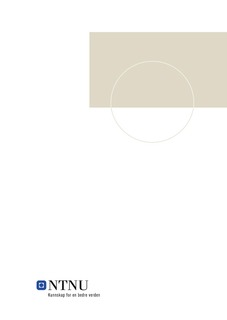| dc.contributor.author | Rautoma, Heini Susanna | |
| dc.date.accessioned | 2018-02-06T08:36:30Z | |
| dc.date.available | 2018-02-06T08:36:30Z | |
| dc.date.issued | 2017 | |
| dc.identifier.uri | http://hdl.handle.net/11250/2482838 | |
| dc.description.abstract | Den här praktisk-teoretiska avhandlingen tar utgångspunkt i projektet 'Rammer', som bestod av en deltagarorienterad skapandeprocess samt etnoteaterföreställningen 'Rammer; en teaterforestilling'. Det praktiska arbetet med en grupp unga vuxna med invandrarbakgrund fokuserade på konstnärlig och social inkludering av unga deltagare i en flerkulturell kontext.
Avhandlingen lyfter fram den postdramatiska etnoteaterns förutsättningar att skapa estetiska möten mellan människor i och med att både deltagare och publik jämför den sceniska verkligheten med egna livserfarenheter. Ett deltagarorienterat synsätt där deltagarna fungerar som informanter, medskapare av föreställningen samt skådespelare ger möjligheter till reflektioner genom dialog och kroppsligt uttryck. Ett för deltagarna bekant tema – i projektets fall fotboll – fungerar som sammanbindande kraft och underlättar facilitatorns arbete med att skapa ett upplägg där deltagare utmanas och inkluderas enligt deras förhandskunskaper och förutsättningar att engagera sig i projektet.
Att bearbeta diskussioner om livssituationen för till Norge flyttade unga vuxna till en poetisk iscensättning hävdas kunna ha en samhällskritisk funktion. I avhandlingen analyseras projektets demokratiska potential genom att dryfta hur det inkluderande och etnografibaserade arbetssättet främjar egenmakt hos deltagare och publik. Demokrati ses som en inneboende del av det konstnärliga arbetet. Projektets demokratiska potential ses som reflexiv med vikt på individens tolkning och upplevelse i möte med andra människor. Kritisk reflektion och dialog ses som en nödvändig del av att namnge och förändra samhälleliga strukturer.
Avhandlingen dryftar projektets förmåga att med en ickehierarkisk bas för arbetet skapa en estetisk scenkonstnärlig helhet, och förslag för forskningsmetodologiska och praktiska förhållningssätt till liknande processer ges. Facilitatorns roll som reflexiv och välkomnande medskapare jämförs med frågeställningar om hur projektets resurser räcker till för att uppnå både estetiska och sociala mål. Projektet konstateras ha potential att främja egenmakt och social gemenskap över kulturella och språkliga gränser i och med att deltagarnas uttrycks- och reflektionsförmåga utvecklas. | nb_NO |
| dc.description.abstract | This practical-theoretical thesis is based on the project Rammer (Frames), that consisted of a participatory creative process and the ethnotheatre performane 'Rammer; en teaterforestilling' (Frames; a theatre performance). The practical work with a group of young adult immigrants focused on artistic and social inclusion in a multicultural context.
The thesis highlights the postdramatic ethnotheatre's conditions for creating aesthetic meetings between humans since participants and audience compare the stage reality with experiences from their own life. A participatory viewpoint where the participants act as informants, co-creators of the performance and actors arguably creates possibilities for reflection through dialog and physical expression. A familiar theme for the participants - football in this project - allegedely works as a unifying force that eases the work of the facilitator by creating an arrangement where the participants are challenged and included based on their prior knowledge and ability to take part in the project.
This thesis argues that working with discussions about the living situation of young adults who have moved to Norway, and developing it to a poetic staging, can have a sociopolitical critical function. In the thesis the project's democratic potential is analyzed through a discussion about how the inclusive and ethnotheatre focused work process promotes empowerment in the participants and the audience. Democracy is seen as an inherent part of the artistic work. The democratic potential of the project is seen as reflexive with importance placed on the individuals interpretation and experience in meeting with other people. Critical reflection and dialog is seen as a crucial part in naming and changing social structures.
The thesis discusses about the project's ability to create an aesthetic performative whole through a non-hierarchical work process, and suggestions for research-methodological and practical approaches for similar projects are provided. The facilitator's role as a reflexive and welcoming co-creator is compared with questions about how the project's resources are sufficient to achieve both aesthetic and social goals. The project is concluded to possess the potential of promoting empowerment and social unity over cultural and linguistic barriers since the participants ability to express themselves and to reflect has developed. | nb_NO |
| dc.language.iso | swe | nb_NO |
| dc.publisher | NTNU | nb_NO |
| dc.subject | etnoteater | nb_NO |
| dc.subject | etnodrama | nb_NO |
| dc.subject | dokumentbasert teater | nb_NO |
| dc.subject | anvendt teater | nb_NO |
| dc.subject | tillämpad teater | nb_NO |
| dc.subject | demokrati | nb_NO |
| dc.title | Demokratisk potential i en flerkulturell inkluderande etnoteaterprocess - En reflektion över föreställningen Rammer | nb_NO |
| dc.type | Master thesis | nb_NO |
| dc.subject.nsi | VDP::Humaniora: 000 | nb_NO |

